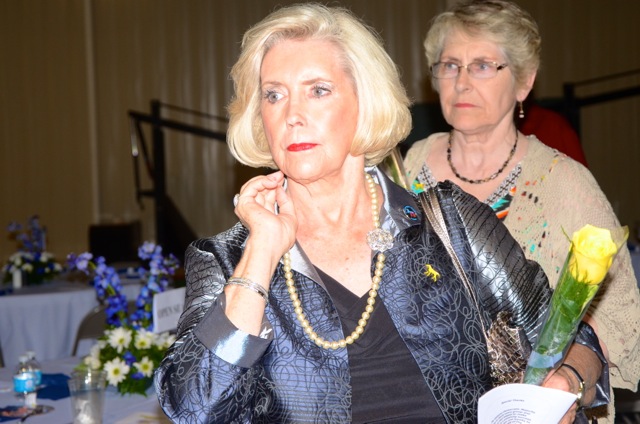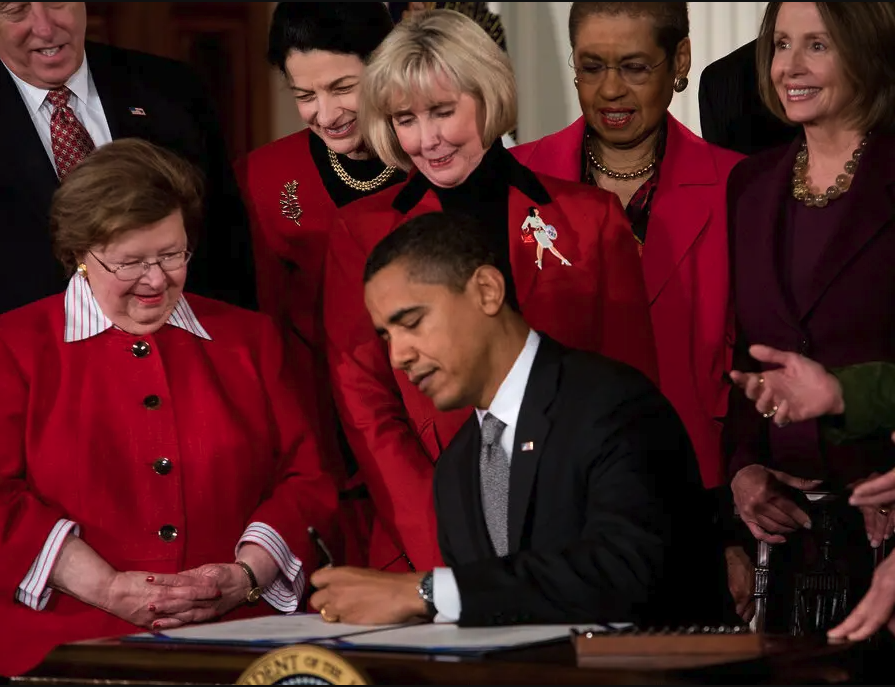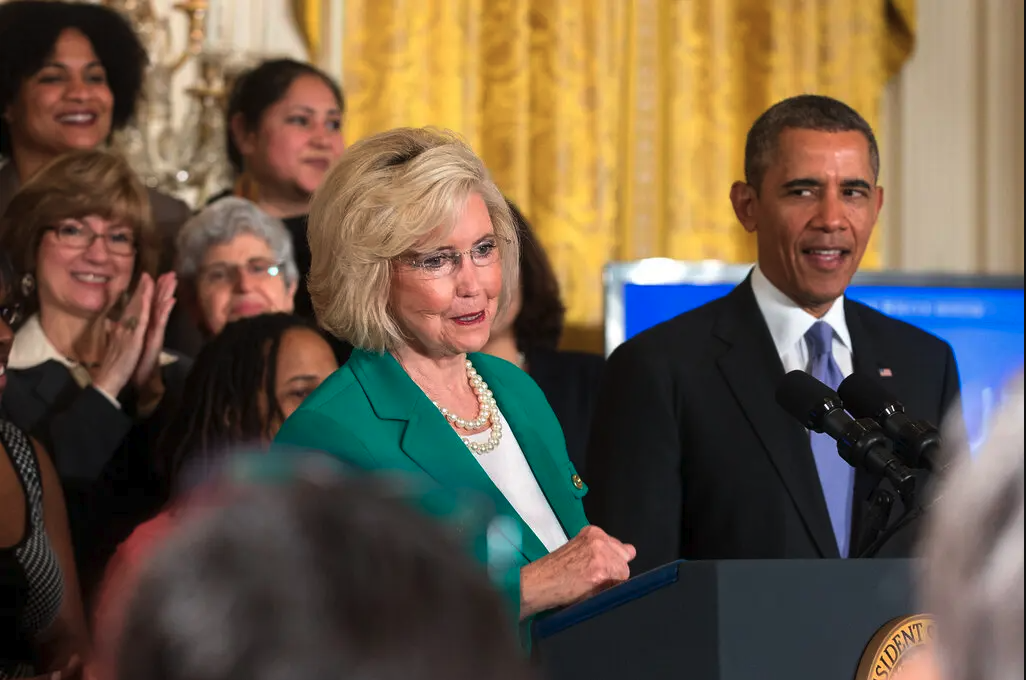
Lilly Ledbetter gets a yellow rose at a Democratic Party fund raiser in Anniston, Alabama in 2013: Glynn Wilson
Staff Report –
Lilly Ledbetter, whose lawsuit against her employer paved the way for the Fair Pay Act of 2009 and who dedicated decades of her life to fighting for equal pay, died in Alabama on Saturday, her family said in a statement. She was 86.
The cause was respiratory failure, the statement said, and indicated she died “peacefully” and “surrounded by her family and loved ones.”
“Our mother lived an extraordinary life,” the family said. “We truly appreciate your respect for our privacy during this time of grief.”
In 1979, Ms. Ledbetter got a job at the Goodyear Tire and Rubber Company in Gadsden, Ala. “We needed that money to pay college tuition and the mortgage,” she said at Forbes Magazine’s women’s summit in 2021.

President Barack Obama signing the Lilly Ledbetter Fair Pay Act in 2009, with Ms. Ledbetter standing behind him: NAJ screen shot/NYT
AL dot com, formerly the Birmingham News, was first to report that she had died, according to CBS News.
Ledbetter’s activism led to the first bill Barack Obama signed into law after becoming president in 2009. The law, called the Lilly Ledbetter Fair Pay Restoration Act, made it easier for workers to sue after discovering what they believed to be pay discrimination.
In signing the measure, Obama said that it sent the message “that there are no second-class citizens in our workplaces, and that it’s not just unfair and illegal, it’s bad for business to pay someone less because of their gender or their age or their race or their ethnicity, religion or disability.”
Ledbetter worked at Goodyear Tire & Rubber in Gadsden, Alabama, for nearly 20 years before discovering she was being paid less than men doing the same job.
The legislation effectively overturned a two-year-old, 5-4 Supreme Court decision that found that Ledbetter didn’t have grounds to sue because she didn’t discover the alleged pay discrimination within six months of it first taking place.
The bill signed by Mr. Obama changed the rules so Ledbetter and workers like her could sue within six months of discovering the alleged pay discrimination, regardless of when it began.
The former president paid tribute to Ledbetter in a post on X, saying she “never set out to be a trailblazer or a household name. She just wanted to be paid the same as a man for her hard work. But this grandmother from Alabama kept on fighting” until he signed the bill bearing her name.
“Lilly did what so many Americans before her have done: setting her sights high for herself and even higher for her children and grandchildren,” Mr. Obama said.
Among others also paying tribute, the AFL-CIO, which called her “a true hero” and Salesforce.com CEO Marc Benioff, who said she “forever changed my understanding with the simple but powerful phrase, “Equal pay for equal work.” It’s shocking that, as a CEO, I witnessed firsthand how wide the pay disparities were—not just in my own company, but across so many others we acquired. Lilly taught me the fight for equality starts with pay equity.”
Ledbetter continued her advocacy well after the law was signed.
She was a big fan of the New American Journal, a personal friend in life and on Facebook, and was quick to endorse Doug Jones for the U.S. Senate in 2017.
“She has been a fighter for equal pay for women and is a tireless advocate for change, traveling the country to urge women and minorities to claim their civil rights,” Jones said at the time in accepting her endorsement, calling her “a true American hero.”
Equal Pay Hero Lilly Ledbetter Endorses Doug Jones for U.S. Senate
She received the Future Is Female Lifetime Achievement Award from Advertising Week last week.
And a movie about her life, “Lilly,” starring Patricia Clarkson, just premiered at the Hamptons International Film Festival.
LILLY: World Premiere – Narrative Feature | USA | 2024 | English | 93 minutes
According to the New York Times obituary, at first, Ms. Ledbetter earned the same as her male counterparts, she said. But over time, her pay dropped “way out of line” compared to that of her male peers — unbeknown to her.
At the factory, she said in 2021, employees could lose their jobs for sharing information about their salaries. It was not until 1998 that Ms. Ledbetter found out, by receiving an anonymous note, that she in fact earned much less than men working the same position.
“I was devastated,” she said.
In a 2018 Opinion essay in The Times, Ms. Ledbetter wrote that she was also sexually harassed early on in her tenure at Goodyear.
After finding out about the pay discrepancy, Ms. Ledbetter went home and talked to her husband. “And we decided to fight,” she said in a speech at the Democratic National Convention in 2012.
Ms. Ledbetter filed a charge with the Equal Employment Opportunity Commission in 1998 and a lawsuit against Goodyear in 1999. In 2003, she won her case at a federal court in Alabama, with the jury awarding her $3.8 million. (In a 2009 interview with NPR, Ms. Ledbetter said that the sum was reduced to a $300,000 cap and $60,000 in back pay.)
But she did not receive any of that money, she told NPR.
The case made it all the way to the Supreme Court, which in 2007 ruled in favor of Goodyear in a 5-4 decision, saying that Ms. Ledbetter had filed her suit too late (more than 180 days) after the initial decision to pay her less than men.
Justice Ruth Bader Ginsburg’s dissenting opinion, Ms. Ledbetter said, inspired her to take the case to Congress. In 2009, Congress approved legislation that expanded workers’ rights to sue in such cases. The Lilly Ledbetter Fair Pay Act changed the time limit so that each discriminatory paycheck — and not just the first one — resets the 180-day limit to file a claim.
It was the first bill that former President Barack Obama signed into law.
“It is fitting that with the very first bill I sign, the Lilly Ledbetter Fair Pay Act, we are upholding one of this nation’s first principles: that we are all created equal and each deserve a chance to pursue our own version of happiness,” Mr. Obama said.
Ms. Ledbetter made it to the White House again in 2014, standing with a group of women behind Mr. Obama as he signed two executive measures that would make it easier for women to learn whether they had been cheated by employers.
Ms. Ledbetter was born Lilly McDaniel in Alabama to J.C. McDaniel, a mechanic, and Edna Smith McDaniel. She is survived by a daughter, Vickie Ledbetter Saxon; a son, Phillip Ledbetter; and several grandchildren. Ms. Ledbetter’s husband, Charles Ledbetter, died in 2008.
Although Ms. Ledbetter would not see any money as a result of the 2009 legislation, she said that she had derived personal satisfaction from the bill.
“Goodyear will never have to pay me what it cheated me out of,” Ms. Ledbetter recalled saying after the signing ceremony. “In fact, I will never see a cent. But with the president’s signature today I have an even richer reward.”

Ms. Ledbetter speaking at an event marking Equal Pay Day at the White House in 2014: NAJ screen shot/NYT
___
If you support truth in reporting with no paywall, and fearless writing with no popup ads or sponsored content, consider making a contribution today with GoFundMe or Patreon or PayPal.
Before you continue, I’d like to ask if you could support our independent journalism as we head into one of the most critical news periods of our time in 2024.
The New American Journal is deeply dedicated to uncovering the escalating threats to our democracy and holding those in power accountable. With a turbulent presidential race and the possibility of an even more extreme Trump presidency on the horizon, the need for independent, credible journalism that emphasizes the importance of the upcoming election for our nation and planet has never been greater.
However, a small group of billionaire owners control a significant portion of the information that reaches the public. We are different. We don’t have a billionaire owner or shareholders. Our journalism is created to serve the public interest, not to generate profit. Unlike much of the U.S. media, which often falls into the trap of false equivalence in the name of neutrality, we strive to highlight the lies of powerful individuals and institutions, showing how misinformation and demagoguery can harm democracy.
Our journalists provide context, investigate, and bring to light the critical stories of our time, from election integrity threats to the worsening climate crisis and complex international conflicts. As a news organization with a strong voice, we offer a unique, outsider perspective that is often missing in American media.
Thanks to our unique reader-supported model, you can access the New American journal without encountering a paywall. This is possible because of readers like you. Your support keeps us independent, free from external influences, and accessible to everyone, regardless of their ability to pay for news.
Please help if you can.
American journalists need your help more than ever as forces amass against the free press and democracy itself. We must not let the crypto-fascists and the AI bots take over.
See the latest GoFundMe campaign here or click on this image.
Don't forget to listen to the new song and video.
Just because we are not featured on cable TV news talk shows, or TikTok videos, does not mean we are not getting out there in search engines and social media sites. We consistently get over a million hits a month.
Click to Advertise Here















